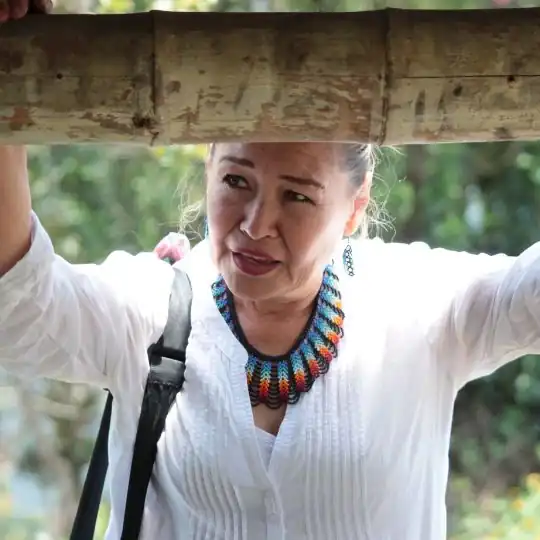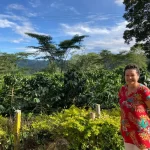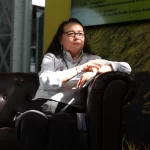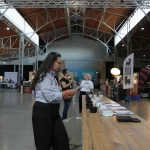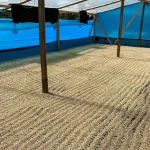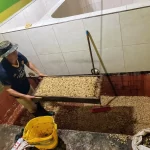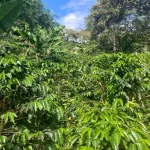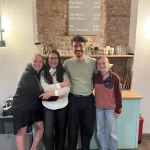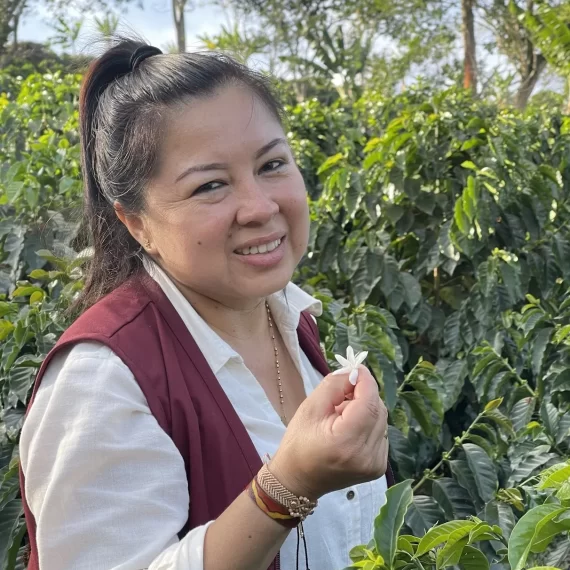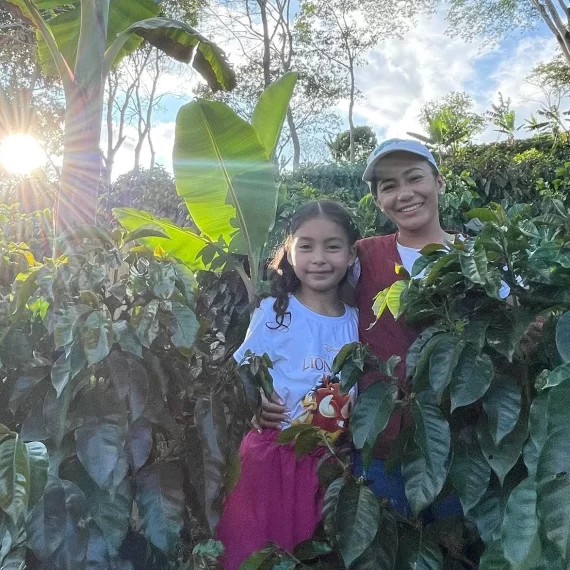
Ana Gloria Rodriguez
Ana Gloria is an immense source of inspiration for us. It’s safe to say that Ana Chicas exists thanks to her. Back in March 2019, as we traveled through Colombia’s coffee regions, we had no idea that just a few months later, we’d be starting our own business. We spent the final week of our coffee journey at Ana’s home, where she connected us with other farmers in her community and, most importantly, gave us the confidence to launch our importer project. To her, Chicas Industry already existed – she believed in us that much from the very beginning.
Huila is now one of the most renowned regions among specialty coffee enthusiasts, particularly the areas around Bruselas, a small town near San Agustin, a city famous for its coffee and tourism. San Agustin is also one of the region’s largest coffee producers, boasting exceptional quality coffee and farmers equipped with extensive knowledge and advanced technology. Farmers here are often part of well-organized associations, making it easy to taste coffee directly from the source.
Ana Gloria has our deepest respect. Behind her warm smile lies a deeply complex life story. She’s a woman who inspires those around her, bridges connections among farmers, and serves as a leader advocating for gender equality in the coffee industry. As the president of an all-women’s farming association under FEDECAFE, Ana champions these causes with unwavering dedication.
ABOUT ANA AND HER FARM
Ana Gloria has been growing coffee for decades, although she didn’t come from a farming background. She moved to Huila over 30 years ago with her then-husband, bought a plot of land, and began cultivating coffee. Together, they had two children: Norma Valentina and Miguel Ángel. While the early years brought some success, challenges in her marriage escalated after Miguel was diagnosed with autism spectrum disorder at age five. Adding to the hardship, Ana herself was diagnosed with breast cancer 15 years ago. Fortunately, both conditions were managed over time.
Ana focused all her energy on caring for Miguel, but her husband became unfaithful, and domestic violence followed. The situation worsened until Ana decided to leave. What ensued was a grueling, four-year-long divorce battle during which her ex-husband tried to leave her with nothing. Ultimately, she was granted 20% of their assets, including a neglected portion of the farm. With her daughter Norma, who was beginning university at the time, as her pillar of support, Ana began rebuilding.
Determined not to give up, Ana relied on friends and her own resilience. Over the past five years, since being awarded part of the farm, she has poured her energy into cultivating specialty coffee. She continually refines her farming processes, attends workshops, and shares her knowledge with others in the community. Today, Ana is admired and respected as a leader in her community. She’s a member of two coffee associations, one of which is an all-women’s group that she passionately champions. Comprising 84 women, many of whom are single mothers like herself, the association has flourished under her leadership.
Ana’s farm, Finca Villa Valentina, employs 80% women, prioritizing those in need. She knows their stories, supports them, and provides a livelihood for their families. Beyond practical assistance, working alongside Ana is inherently empowering – she instills confidence and trust in everyone around her.
About the coffee
Finca Villa Valentina is nestled near the town of Bruselas in the southern part of Huila, within the village of La Hacienda. Ana Gloria cultivates five hectares of coffee, focusing on traditional varieties like Castillo, Colombia, and Caturra. While some of the coffee trees are over 30 years old, the farm underwent a full renovation five years ago. Looking ahead, Ana plans to introduce lesser-known varieties to diversify her crop.
On her farm, Ana processes her coffee primarily using the traditional washed method. However, in recent years, she has ventured into honey and natural processing methods, achieving significant success with these experimental techniques.
During the harvest, only ripe cherries were carefully picked. The cherries underwent floating and were fermented in their whole form inside barrels with valves. The barrels were stirred three times a day to ensure an even fermentation process, which lasted for three days. After fermentation, the cherries were depulped, and the coffee was placed into the stainless steel hoppers of the Ecomill machine. The following morning, the coffee was washed in the Ecomill wet mill using environmentally friendly technology that requires minimal water. Finally, the coffee was dried in a traditional dryer for eight days at a maximum temperature of 40°C.
During the harvest, only ripe cherries were carefully picked. The cherries underwent floating and were fermented in their whole form inside barrels with valves. The barrels were stirred three times a day to ensure an even fermentation process, which lasted for three days. After fermentation, the cherries were depulped, and the coffee was placed into the stainless steel hoppers of the Ecomill machine. The following morning, the coffee was washed in the Ecomill wet mill using environmentally friendly technology that requires minimal water. Finally, the coffee was dried in a traditional dryer for eight days at a maximum temperature of 40°C.
During the harvest, only ripe cherries were carefully picked. The cherries underwent floating and were fermented in their whole form inside barrels with valves. The barrels were stirred three times a day to ensure an even fermentation process, which lasted for four days. After fermentation, the cherries were depulped, and the coffee was placed into Ecomill tanks for two days for oxidation. The coffee was then washed in a wet mill using only 0.7 liters of water. Finally, it was dried in a traditional dryer. The drying process lasted between 12 to 15 days on African beds.


